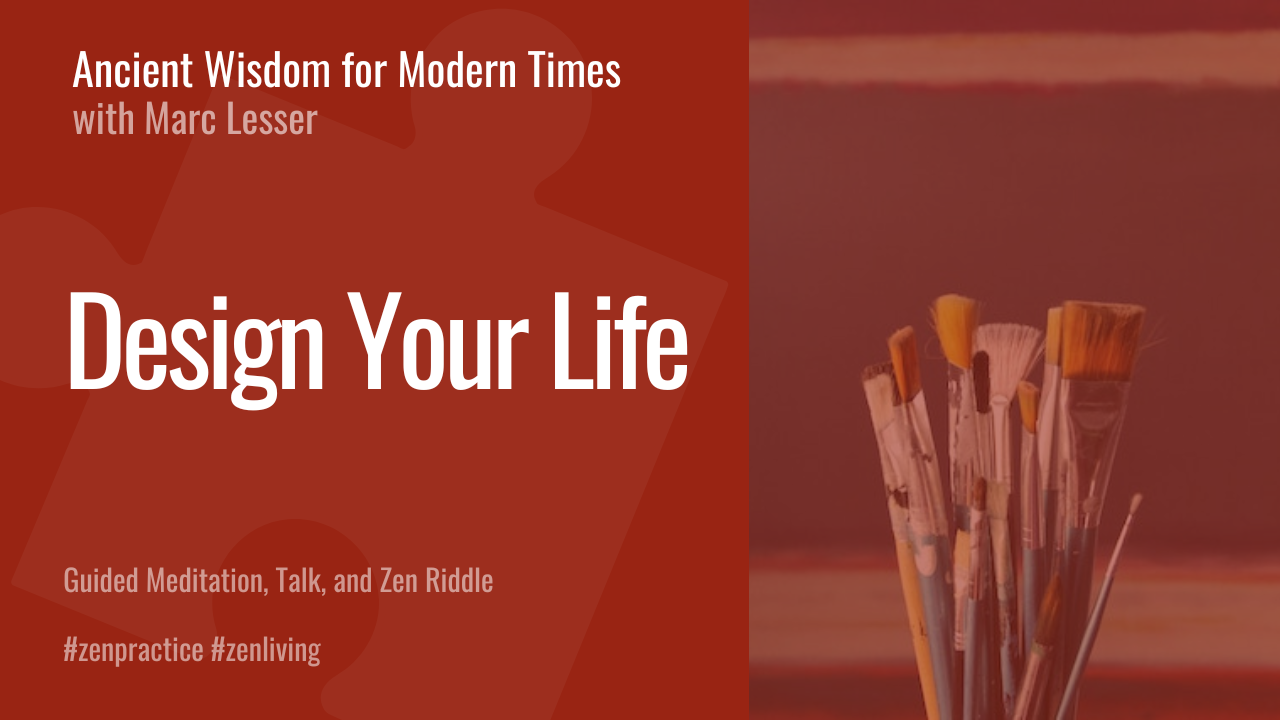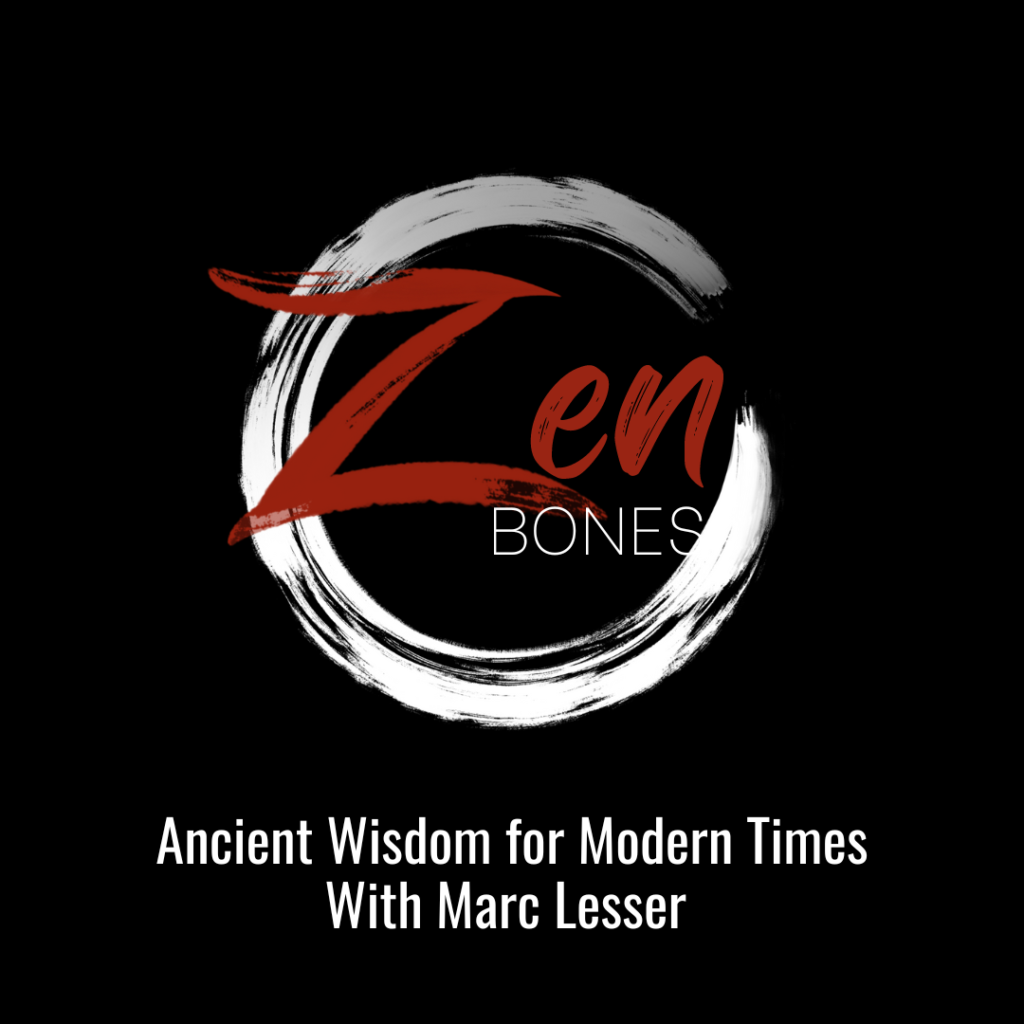How are you designing, and living your life? In this episode Marc begins with a short guided meditation. Then he unpacks the teachings of Zen teacher Shunryu Suzuki who says “The more you practice meditation, the more you will be interested in your everyday life.” and “You will discover what is necessary and what is not; what part to correct and what part to emphasize more.” Marc reads and comments on a poem by William Stafford called Just thinking. This episode’s Zen puzzler is Ordinary Mind Is the Way. How to design your life – with your ordinary, extraordinary mind.
EPISODE TRANSCRIPT
Marc Lesser: Welcome to Zen Bones: Ancient Wisdom For Modern Times. This is Marc Lesser. Why Zen Bones? Our world is in crisis and evershifting, and now, more than ever, more wisdom, clarity, and courage are essential, especially in the world of work, business, and leadership. In this episode, the topic is designing your life. How are you designing your life? How do you think about it? In this episode, I lean on and rely on the teachings of Zen teacher, Shunryū Suzuki, who says, “The more you practice meditation, the more you’ll be interested in your everyday life.
You will discover what is necessary and what is not, what part to correct and what part to emphasize more.” He goes on to say, “So by practice, you will know how to organize your life.” This episode is about the inner work of designing your life. I go on to read a poem called Just Thinking by William Stafford about this topic. Then today’s Zen puzzler is ordinary mind is the way. How can we work with our ordinary extraordinary minds to design our lives, to live our lives with great wonder, awe, and purpose, and meaning? I hope you enjoy this episode. Thank you. Let’s do some sitting practice together.
Right now, whatever you happen to be doing, and just seeing what it’s like to pause, to stop. Both ordinary and sacred pause of bringing attention to your experience, experiencing your experience. I think of the 90-day practice period I did a few years ago at Tassajara, where the theme was experience the experience you are experiencing. It’s about noticing. Right now, noticing whatever you are feeling, sensing what is happening with your sensations right now. What are you seeing, hearing, feeling, tasting, touching, thinking?
Just noticing, no need to change anything, it’s completely normalized, ordinary, and yet, when we let go of some of the busyness, the noise, there is opening. Opening our senses, opening the mind, opening the heart, and bringing a sense of a curiosity, and as well as some sense of wonder and awe. It’s amazing. This body and mind and heart that we have been given, all gift and all completely impermanent. Our thoughts and our bodies and minds coming like a flash. A flash here now and gone, here now and then gone.
Appreciating these gifts right now. Not getting too complicated, just noticing. This is, I think the fundamental practice of being aware of the breath, using the breath as a focus point, as an anchor. This breath that has been with us from the moment we were born, from the moment we arrived, and will be with us till our last breath. This paradox of how ordinary, how simple, and yet extraordinary and sacred at the same time as ordinary. The theme for this time together is designing your life. I think this is the most effective, profound starting point for designing our lives, making important decisions, allowing our lives to emerge.
Letting go of the idle concerns, the busyness, and bringing a sense of wonder and awe, and keeping it simple, breath, body, feelings, whatever is in your heart right now. Please, you can, and I can encourage you to maybe pause and continue sitting on your own, appreciating the silence, appreciating whatever you are experiencing. Of course, to bring this approach into your daily life, into your work, into your relationships, bringing this approach of curiosity, awe, wonder, and simplicity. Creating that spaciousness, that awareness, bringing your full experience into designing your life, living your life. Please do, thank you.
[music]
In today’s episode, I want to talk about this, one of my favorite topics, designing your life. Usually, when I think of this topic, my mind goes to thinking about work, our families, and our friends, our travel plans. How do we want to spend our time? This topic has become, I think, particularly relevant, interesting, maybe puzzling. As we’ve been transitioning out, I think of a few years of pandemic where there was a near lockdown.
These questions of how we use our time and our schedules, how we’re living. For many of us there was suddenly a lot more space, a lot more options about what mattered. Many people were shifting work, doing things long distance virtually that were thought to be impossible. I know that was true for me, how all of the work that I do from one-on-one coaching to doing especially, trainings, people thought it was impossible to do them virtually, and yet, here I am.
My life has been taking on a very different look and feel. At the same time, here we are witnessing shifting of civilization from the war in Ukraine, how we’re dealing with climate change, but seeing neighborhoods turn to rubble with the war. Some neighborhoods turn to rubble with the results of climate change and wondering how do we respond? What does this have to do with us? What do I do with my own life? Feeling this immense privilege of even being able to see from this perspective and ask these questions.
For me, these questions of designing our life start with how do we design our internal lives? How do we design our own practice? This practice that we call [unintelligible 00:11:02] practice or contemplative practice, or mindfulness practice. This, I think, is the ground, the basis of which this question of designing our lives sits on and emanates from, not to be overlooked. It’s not just moving external pieces around.
It’s the dance, the noticing where, from what ground, from what basis do we make these decisions from? I’ve been studying the writing and teachings of a Zen teacher, Shunryū Suzuki. In one of his talks in the book Not Always So, he says, “The more you practice meditation, the more you will be interested in your everyday life.” This may sound like a throwaway quote, but really it’s like the more we stop, the more we practice paying attention to our experience. It opens doorways to looking at our everyday lives from a very different perspective.
This particular sentence, the more you practice meditation, the more you will be interested in your everyday life makes me think of a drawing that I have framed and that sits on the wall right here. I’m actually looking at it right now. It’s a drawing and some calligraphy by Shunryū Suzuki’s Son Hoitsu Suzuki. It’s a simple image of a Zen monk and a frog looking at each other. The calligraphy says, “Everywhere you go is your temple.” I think this is in a way, what is meant by you will be interested in your everyday life, that all of your activities become more focused, more alive.
Everyday activities are contextualized, are experienced more as an expression of what really matters, of our practice of the ordinary and the sacred at the same time. This is the practice of not turning away from pain and difficulty, as well as not turning away from the joy and wonder and awe and the possibilities. Keeping our hearts open as much as possible. There’s another line where he says, “You will discover what is necessary and what is not, what parts to correct and what parts to emphasize more.” Again, this is from Shunryū Suzuki not always so, talking about why we meditate, why we practice. You will discover what is necessary and what is not necessary.
You will discover what parts to change and what parts to emphasize more. I’m finding it especially right now, in this time in my own life, during the Pandemic and during the war, really looking at what is necessary, what is needed. I think this is a valuable, ongoing question. Letting go of what isn’t necessary. Asking this question can be a way of clarifying what changes do we want to make? What shifts do we want to make? What needs more and less emphasis in our lives? By practice, we can find out how to design our lives.
For me, organizing my life literally means to make time for meditation, for study, for deepening my relationships, as well as wrestling with the questions, how can I help? What can I offer? What can I do in this crazy, mixed-up world that we find ourselves living in? It also makes me keep coming back to the practice of appreciation and to wonder. This simple kind of organizing our lives, adding more and more sense, value. This is to observe your situation accurately, to clear your mind, and begin from your original starting point.
This is another line from this talk. This is to observe your situation accurately, starting by clearing your mind and beginning from your original starting point. This is like seeing meditation as hitting the reset button with each breath, with each period of meditation, and starting fresh. What is your situation? What is the situation of our world? What’s working well and what needs more attention? How can we see our lives more accurately and more clearly? Shunryū Suzuki’s response to this question is clear your mind and begin from your original starting point.
This, I think, is a fundamental value assumption practice of Zen practice, which really, to me, Zen practice is human practice. The idea and practice of returning, loosening our grasping, our aversion, letting go of mistaken beliefs, and coming back to the beginning, coming back to zero again and again, as much as possible. Here is a very short poem called Just Thinking by William Stafford. A poem that calls to me about reflecting on returning to what matters most as we design our lives.
Got up on a cool morning. Leaned out a window.
No cloud, no wind. Air that flowers held
for awhile. Some dove somewhere.
Been on probation most of my life. And
the rest of my life been condemned. So these moments
count for a lot—peace, you know.
Let the bucket of memory down into the well,
bring it up. Cool, cool minutes.
No one stirring, no plans. Just being there.
This is what the whole thing is about.
This poem, I think, is, again, designing our internal lives so that we can more effectively, skillfully design our lives. Thank you.
[music]
Welcome to the Zen Bones puzzler, where I will regularly be presenting a story or a Zen cone, or a poem. Something to contemplate. To think about. A story that has purpose. It’s about developing greater insight and reflection, not so much for a solution, but as a way to support your practice, a kind of meditation in daily life.
[music]
Today’s Zen puzzler comes from one of the more famous Zen stories from a collection. It’s called The [unintelligible 00:20:31] was a collection by Zen teacher [unintelligible 00:20:37] from China, I think in the maybe seventh or eighth century, in which a teacher asked, or a student asked the a famous teacher, [unintelligible 00:20:52] “What is the Dao or what is the way, or what does it mean to be fully human?”
This is the question. In this case, the teacher responded [sound cut] mind, or everyday mind is the way. In some way, the puzzler here isn’t so much the question. The puzzler here is the answer. What did this Zen teacher mean and what does it mean ordinary mind is the way? Be careful. Here, ordinary doesn’t mean what we usually think of as ordinary. He might have said, sacred mind is the way, or extraordinary mind is the way. [chuckles] There’s a few other clues here. After responding, ordinary mind is the way, the student who asked this question asked another question, and he said, “Should I direct myself toward it?”
The teacher said, “If you do, you’ll be lost. You will betray yourself and your practice.” The student goes on and says, “Then how will I know it?” The teacher here responds, “Knowing is arrogance and not knowing is stupidity. The genuine way is vast and boundless. It can’t be experienced. It can’t be discussed at the level of knowing or not knowing, at affirmation or negation.” [chuckles] This so-called ordinary mind we see is not so ordinary after all. I think, partly, it’s beautifully paradoxical in that it’s both the way our human life– designing our lives is both ordinary and extraordinary at the same time.
A paradox by definition is something that appears impossible, but may in fact be so, may in fact be true like this, ordinary and extraordinary. What is the way ordinary mind? Ordinary mind is the way. How should we practice? How should we live our lives? How should we design our lives with ordinary mind? In these traditional Zen teachings, the person who collects it often writes some commentary, some short poem. In this case, [unintelligible 00:24:26] who’s the collector of this particular puzzle, says, “Spring comes with flowers, autumn with the moon, summer with breeze, winter with snow. When idle concerns don’t hang in your mind, this is your best season.”
Here in this verse, he’s beautifully just describing nature, spring and flowers, autumn, moon, the summer breeze, the snow of winter, just how ordinary, what could be more ordinary? Then he says, “When idle concerns don’t hang in your mind, this is your best season.” I think he’s saying, “Don’t be fooled by what looks ordinary. It is extraordinary. It is filled with awe and wonder, ordinary mind.” So simple. A little bit again, like this [unintelligible 00:25:38] quote that I often come back to, where he says, “The real miracle is not to walk on water. The real miracle is to walk right here on earth.”
Here, the real miracle is to let go of idle concerns and experience the flowers of spring, the moon of autumn, the summer breeze, the smile of a child, your own hand, your experience as [sound cut] and extraordinary. What is the best season when idle concerns do not take up space in our mind? The suggested practice here is to stay with this line. Ordinary mind is the way, everyday mind is the way. You can experiment with during meditation practice or any time. While you’re driving or in a meeting, in a conversation. Merry mind is the way, and see what happens. See how this can support you in living on this edge of the ordinary and the sacred, the ordinary, and the extraordinary.
See how this contributes and supports designing your life, living your life that is completely ordinary and completely extraordinary.
[music]
Listen in each week for interviews, teachings, and guided meditations, you’ll receive supportive tools for creating more meaningful work and mindfulness practices to develop yourself, to influence your organization, and to help change the world. Thank you for listening.
[00:27:54] [END OF AUDIO]









